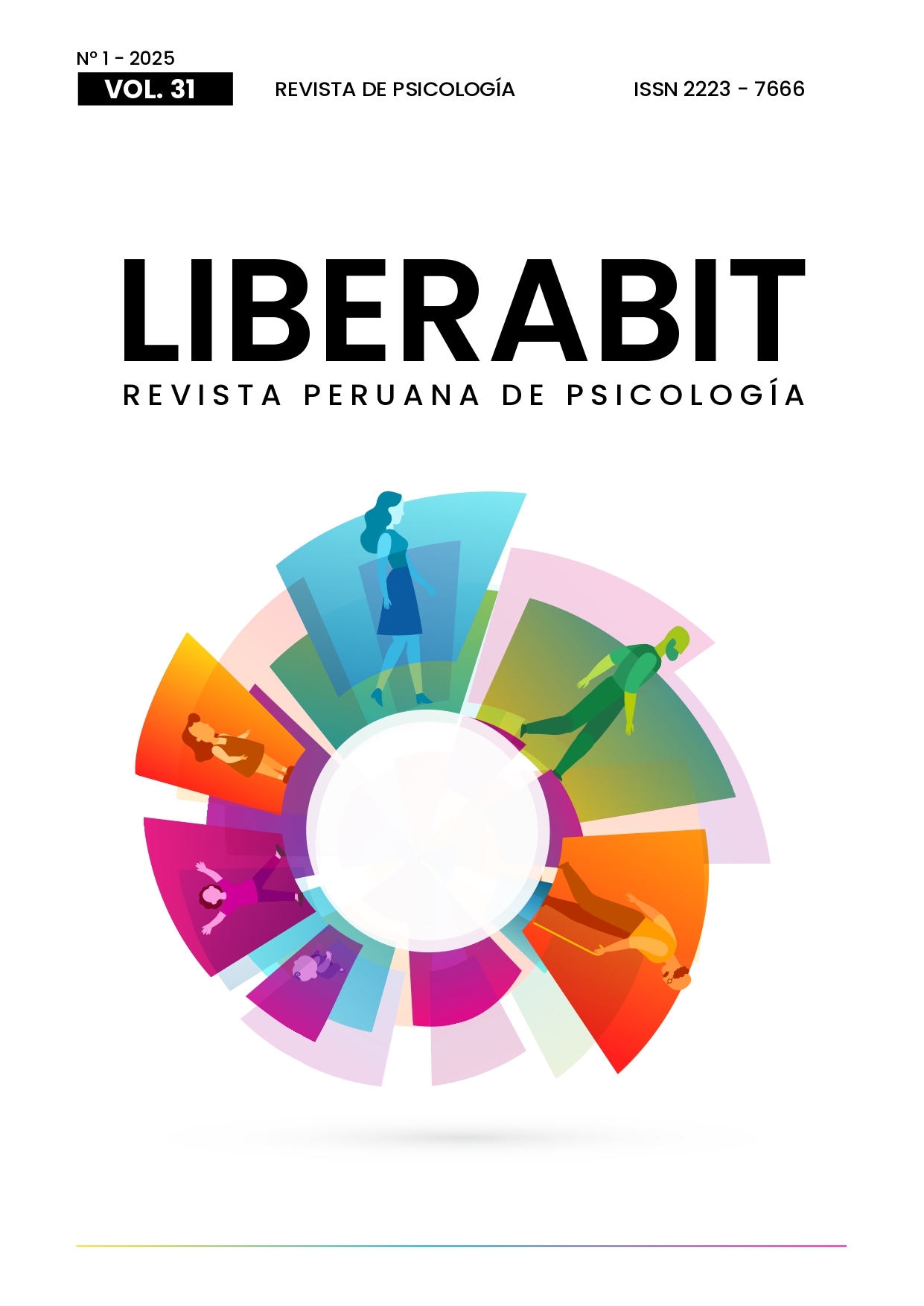Assessment Tool for Targeted Parents of Parental Alienation (PA): Construction and Validation
DOI:
https://doi.org/10.24265/liberabit.2025.v31n1.947Palavras-chave:
parental alienation, targeted parents, adults, alienated parents, family structure, factor analysis, divorceResumo
Background: This study is a first approach to the assessment of parental alienation from the perspective of alienated (targeted) parents. Parental alienation is a phenomenon that occurs during or after separation or divorce when one parent use strategies to hinder the relationship between their children and the other parent resulting in children hating and rejecting to the targeted parent with no reason (in absence of violence or negligence exerted by the alienated parent). Objective: The Aim of this study was to build an instrument that identifies cases and measures parental alienation from the perspective of alienated (targeted) parents. Method: A quantitative methodology with instrumental design was used and 291 parents from Arica in Chile participated. A factor analysis was performed with Maximum Likelihood extraction method, Varimax rotation and reliability analysis. Results: An assessment tool of 20 ítems ordered in three factors was obtained identifying controlling and violent behaviors by the ex-partner, alienating behaviours perpetrated by the alienating parent and alienating behaviours perpetrated by the alienated child. The assessment tool showed a McDonald´s omega = .939. The three factors showed high scores as well. Conclusion: The results suggest that the AP-Alienated Scale has values that make it valid and reliable. Also, parental alienation is a form of family violence.
Downloads
Referências
Avieli, H., & Levy, I. (2022). «I Feel Erased»: A Qualitative Analysis of Grandparents’ Experiences of Parental Alienation. Family Relations, 72(3), 976-992. https://doi.org/10.1111/fare.12704
Baker, A. J. L. (2005a). The Long-Term Effects of Parental Alienation on Adult Children: A Qualitative Research Study. The American Journal of Family Therapy, 33(4), 289-302. https://doi.org/10.1080/01926180590962129
Baker, A. J. L. (2005b). The Cult of Parenthood: A Qualitative Study of Parental Alienation. Cultic Studies Review, 4(1).
Baker, A. J. L. (2010). Even when you Win you Lose: Targeted Parents’ Perception of their Attorneys. The American Journal of Family Therapy, 38(4), 292-309. https://doi.org/10.1080/01926187.2010.493429
Baker, A. J. L., Burkhard, B., & Albertson-Kelly, J. (2012). Differentiating Alienated from not Alienated Children: A Pilot Study. Journal of Divorce and Remarriage, 53(3), 178-193. https://doi.org/10.1080/10502556.2012.663266
Baker, A. J. L., & Chambers, J. (2011). Adult Recall of Childhood Exposure to Parental Conflict: Unpacking the Black Box of Parental Alienation. Journal of Divorce & Remarriage, 52(1), 55-76. https://doi.org/ 10.1080/10502556.2011.534396
Baker, A. J. L., & Darnall, D. C. (2006). Behaviors and Strategies Employed in Parental Alienation. Journal of Divorce & Remarriage, 45(1-2), 97-124. https:// doi.org/10.1300/J087v45n01_06
Baker, A. J. L., & Darnall, D. C. (2007). A Construct Study of the Eight Symptoms of Severe Parental Alienation Syndrome: A Survey of Parental Experiences. Journal of Divorce and Remarriage, 47(1-2), 55-75. https:// doi.org/10.1300/J087v47n01_04
Baker, A. J. L., & Fine, P. R. (2014). Surviving Parental Alienation: A Journey of Hope and Healing. Rowman & Littlefield.
Balmer, S., Matthewson, M., & Haines, J. (2017). Parental Alienation: Targeted Parent Perspective. Australian Journal of Psychology, 70(1), 91-99. https://doi.org/10.1111/ajpy.12159 15
Bentley, C., & Matthewson, M. (2020). The not-Forgetten Child: Alienated Adult Children´s Experiences of Parental Alienation. The American Journal of Family Therapy, 48(5), 509-529. https://doi.org/10.1080/ 01926187.2020.1775531
Bernet, W., & Baker, A. (2013). Parental Alienation, DSM-5, and ICD-11: Response to Critics. Journal of the American Academy of Psychiatry and the Law, 41, 98- 104. http://www.jaapl.org/content/41/1/98.full.pdf
Bernet, W., & Greenhill, L. L. (2022). The Five-Factor Model for the Diagnosis of Parental Alienation. Journal of American Academy of Child and Adolescence Psychiatry, 61(5), 591-594. https://doi.org/10.1016/j.jaac.2021.11.026
Bernet, W., Gregory, N., Reay, K. M., & Rohner, R. P. (2018). An Objective Measure of Splitting in Parental Alienation: The Parental Acceptance-Rejection Questionnaire. Journal of Forensic Sciences, 63(3), 776-783. https://doi.org/10.1111/1556-4029.13625
Bernet, W., Von Boch-Galhau, W., Baker, A. J. L., & Morrison, S. L. (2010). Parental Alienation, DSM-V, and ICD-11. The American Journal of Family Therapy, 36(2), 76-187. https://doi.org/10.1080/01926180903586583
Bounds, O., & Matthewson, M. (2022). Parental Alienating Behaviours Experienced by Alienated Grandparents. Journal of Family Issues, 44(12). https://doi.org/ 10.1177/0192513X221126
Clawar, S. S., & Rivlin, B. V. (1991). Children Held Hostage: Dealing with Programme and Brainwashed Children. American Bar Association Section of Family Law.
Cunha, P. I., Camargo, E. B., Fernandes, M. G. (2016). Analysis of the Psychometric Properties of a Parental Alienation Scale. Paidéia, 26(65), 291-298. https:// doi.org/10.1590/1982-43272665201602
Fidler, B. J., & Bala, N. (2010). Children Resisting PostSeparation Contact with a Parent: Concepts, Controversies, and Conundrums. Family Court Review, 48(1), 10-47. https://doi.org/10.1111/j.1744- 1617.2009.01287.x
Garber, B. (2011). Parental Alienation and the Dynamics of the Enmeshed Parent-Child Dyad: Adultification, Parentification, and Infantilization. Family Court Review, 49(2), 322-335. https://doi.org/10.1111/j.1744- 1617.2011.01374.x
Golly, C. A. (2019). Grandparents Cut off from Grandchildren: An Exploratory Study. [Tesis doctoral, Barry University].
Gordon, R. M., Stoffey, R., & Bottinelli, J. (2008). MMPI-2 Findings of Primitive Defenses in Alienating Parents. American Journal of Family Therapy, 36(3), 211-228. https://doi.org/10.1080/01926180701643313
Haines, J., Matthewson, L. M., & Turnbull, M. (2020). Understanding and Managing Parental Alienation: A Guide to Assessment and Intervention. Routledge.
Harman, J. J., Bernet, W., & Harman, J. (2019). Parental Alienation: The Blossoming of a Field of Study. Current Directions in Psychological Science, 28(2), 212-217. https://doi.org/10.1177/0963721419827271
Harman, J., & Biringen, Z. (2016). Parents Acting Badly: How Institutions and Societies Promote the Alienation of Children from their Loving Families. The Colorado Parental Alienation Project.
Harman, J., Giancarlo, C., Lorandos, D., & Ludmer, B. (2023). Gender and Child Custody Outcomes Across 16 Years of Judicial Decisions Regarding Abuse and Parental Alienation. Children and Youth Services Review, 155, 1-13. https:/doi.org/10.1016/j.childyouth.2023.107187
Harman, J., Kruk, E., & Hines, D. (2018). Parental Alienating Behaviours: An Unacknowledged form of Family Violence. Psychological Bulletin, 144 (12), 1275-1299. https://doi.org/10.1037/bul0000175
Harman, J., & Matthewson, M. L. (2020). Parental Alienating Behaviors: How is it Done? In D. Lorandos, & W. Bernet (eds.), Parental Alienation: Handbook for Mental Health and Legal Professionals (2.a ed., pp. 82-141).
Charles C. Thomas Publisher. Johnston, J. R., Walters, M. G., & Olesen, N. W. (2005). Is it Alienating Parenting, Role Reversal or Child Abuse? A Study of Children’s Rejection of a Parent in Child Custody Disputes. Journal of Emotional Abuse, 5(4), 191-218. https://doi.org/10.1300/J135v05n04_02
Kelly, J. B., & Johnston, J. R. (2001). The Alienated Child: A Reformulation of Parental Alienation Syndrome. Family Court Review, 39(3), 249-266. https://doi.org/ 10.1111/j.174-1617.2001.tb00609.x
Kopetski, L. M. (1998a). Identifying Cases of Parental Alienation Syndrome - Part I. The Colorado Lawyer, 27(2), 65-68.
Kopetski, L. M. (1998b). Identifying Cases of Parental Alienation Syndrome - Part II. The Colorado Lawyer, 27(3), 61-64.
Kruk, E. (2018). Parental Alienation as a Form of Emotional Child Abuse: The current State of Knowledge and Directions for Future Research. Family Science Review, 22(4), 141-164.
Kruk, E. (2019, January 10). Parental Alienation as Child Abuse and Family Violence: A Form of Emotional Aggression and Intimate Terrorism. Psychology Today. https://www.psychologytoday.com/us/blog/coparenting-after-divorce/201901/parental-alienationchild-abuse-and-family-violence
Laughrea, K. (2002). Alienated Family Relationship Scale: Validation with Young Adults. Journal of College Student Psychotherapy, 17, 37-48. https://doi.org/ 10.1300/J035v17n01_05
Lee-Maturana, S., & Matthewson, M. (2021). Alienación parental: una revisión sistemática de la literatura basada en evidencia publicada en idioma español. Límite, Revista Interdisciplinaria de Filosofía y Psicología, 16(3), 1-13. https://revistalimite.uta.cl/index.php/limite/ article/view/192/217
Lee-Maturana, S., Matthewson, M., & Dwan, C. (2020a). Targeted Parents Surviving Parental Alienation: Consequences of the Alienation and Coping Strategies. Journal of Child and Family Studies, 29, 2268-2280. https://doi.org/10.1007/s10826-020-01725-1
Lee-Maturana, S., Matthewson, M., & Dwan, C. (2021a). Understanding Targeted Parents’ Experiences of Parental Alienation: A Qualitative Description from their Own Perspective. The American Journal of Family Therapy, 49(5), 499-516. https://doi.org/10.1080/ 01926187.2020.1837035
Lee-Maturana, S., Matthewson, M., & Dwan, C. (2021b). The Key Findings on Targeted Parents´ Experiences: Towards a Broarder Definition of Parental Alienation. Journal of Family Issues, 43(10), 1-29. https://doi.org/ 10.1177/0192513X211032664
Lee-Maturana, S., Matthewson, M., Dwan, C., & Norris, K. (2018). Characteristics and Experiences of Targeted Parents of Parental Alienation from their Own Perspective: A Systematic Literature Review. Australian Journal of Psychology, 71(2), 83-91. https://doi.org/ 10.1111/ajpy.12226
Lorandos, D., & Bernet, W. (2020). Parental AlienationScience and Law. Charles C. Thomas Publisher. Lorandos, D., Bernet, W., & Sauber, S. R. (eds.). (2013). Parental Alienation: The Handbook for Mental Health and Legal Professionals (Behavioral Science and Law). Charles C. Thomas Publisher.
Organización Mundial de la Salud. (2012). Understanding and Addressing Violence Against Women. Intimate Partner Violence. https://iris.who.int/bitstream/handle/ 10665/77432/WHO_RHR_12.36_eng.pdf?sequence=1
Organización Mundial de la Salud. (2013). Comprender y abordar la violencia contra las mujeres. Violencia infligida por la pareja. https://iris.who.int/handle/10665/ 98816
Poustie, C., Matthewson, M., & Balmer, S. (2018). The Forgotten Parent: The Targeted Parent Perspective of Parental Alienation. Journal of Family Issues, 39(12), 1-26. https://doi.org/10.177/0192513X187867
Rand, D. C. (1997a). The Spectrum of Parental Alienation Syndrome (Part I). American Journal of Forensic Psychology, 15(3), 1-50.
Rand, D. C. (1997b). The Spectrum of Parental Alienation Syndrome (Part II). American Journal of Forensic Psychology, 15(4), 1-33.
Siegel, J. C., & Langford, J. S. (1998). MMPI-2 Validity Scales and Suspected Parental Alienation Syndrome. American Journal of Forensic Psychology, 16(4), 5-14.
Tapias, A. C., Sánchez, L. A., & Torres, S. T. (2013). Reconocimiento de indicadores de alienación parental en operadores de justicia de Bogotá. Suma Psicológica, 20(1), 111-120.
Templer, K., Matthewson, M., Haines, J., & Cox, G. (2017). Recommendations for Best Practice in Response to Parental Alienation: Findings from a Systematic Review. Journal of Family Therapy, 39(1), 103-122. https://doi.org/10.1111/1467-6427.12137
Thomson, R., Matthewson, M., & Lee-Maturana, S. (en revisión). Family Violence and Parental Alienating Behaviours. Turkat, I. D. (1999). Divorce Related Malicious Parent Syndrome. Journal of Family Violence, 14(1), 95-97.
Vassiliou, D., & Cartwright, G. F. (2001). The Lost Parents’ Perspective on Parental Alienation Syndrome. The American Journal of Family Therapy, 29(3), 181-191. https://doi.org/10.1080/019261801750424307
Verhaar, S., Matthewson, M., & Bentley, C. (2022). The Impact of Parental Alienating Behaviours on the Mental Health of Adults Alienated in Childhood. Children, 9(4), 475. https://doi.org/10.3390/children9040475
Verrocchio, M. C., Baker, A. J. L., & Bernet, W. (2016). Associations Between Exposure to Parental Alienating Behaviors, Anxiety, and Depression in an Italian Sample of Adults. Journal of Forensic Sciences, 61(3), 692- 698. http://dx.doi.org/10.1111/1556-4029.13046
Warshak, R. A. (2010). Divorce Poison. Harper Collins Publishers. Zicavo, N., Rey, R., & Ponce, L. (2022). ZICAP II Scale: Parental Alienation Assessment in 9 to 15 Years-Old Children of Separated Parents in Chile. Ciencias Psicológicas, 15(1), e-2159. https://doi.org/10.22235/ cp.v15i1.2159
Downloads
Publicado
Edição
Seção
Licença
Copyright (c) 2025 Saulyn Lee-Maturana, Mauricio Ramírez-Pérez, Cecilia Mayorga-Muñoz, Leonor Riquelme-Segura, Julio Tereucán-Angulo

Este trabalho está licenciado sob uma licença Creative Commons Attribution 4.0 International License.
Direitos autorais: Caso o manuscrito seja aprovado para publicação futura, os autores retêm os direitos autorais e atribuem à revista os direitos de publicar, editar, reproduzir, distribuir, exibir e comunicar nacional e internacionalmente nos diversos bancos de dados, repositórios e portais.
Política de auto-arquivamento: O autor pode compartilhar, disseminar e divulgar suas pesquisas publicadas pela mídia (por exemplo, redes sociais acadêmicas, repositórios e portais) disponíveis na web. Durante o processo de revisão editorial, a revista fornecerá ao autor as versões anteriores (pós-impressão) que NÃO devem ser divulgadas por nenhum meio de comunicação, apenas para uso pessoal e para aprovação final. Liberabit, enviará ao autor a versão final do artigo (versão publicada) em PDF e HTML para ser compartilhada, divulgada e divulgada pela mídia disponível na web. Após a publicação dos artigos, os autores podem fazer outros acordos independentes ou adicionais para a divulgação não exclusiva da versão do artigo publicado nesta revista (publicação em livros ou repositórios institucionais), desde que seja indicado com a respectiva referência que a obra foi publicada pela primeira vez nesta revista.











